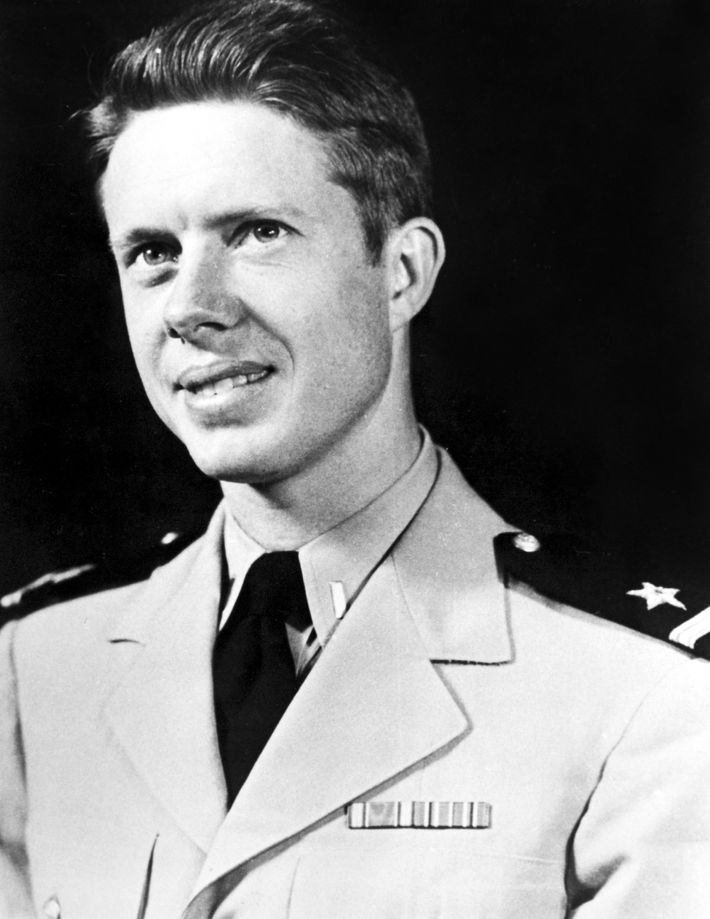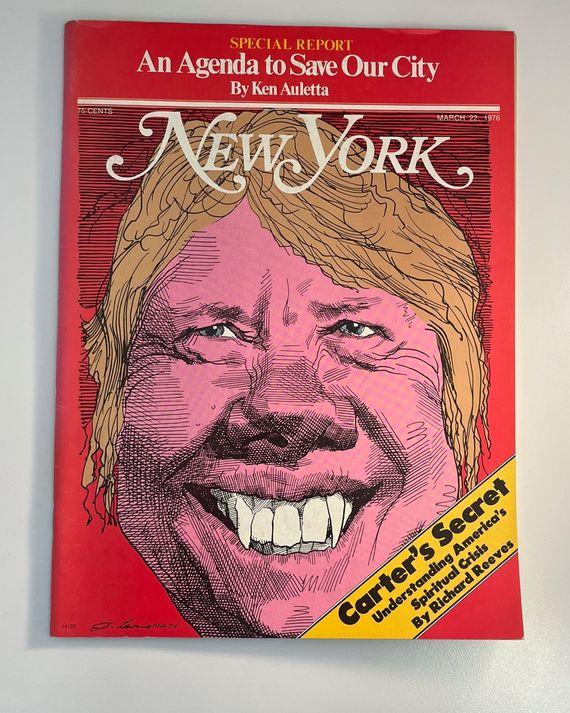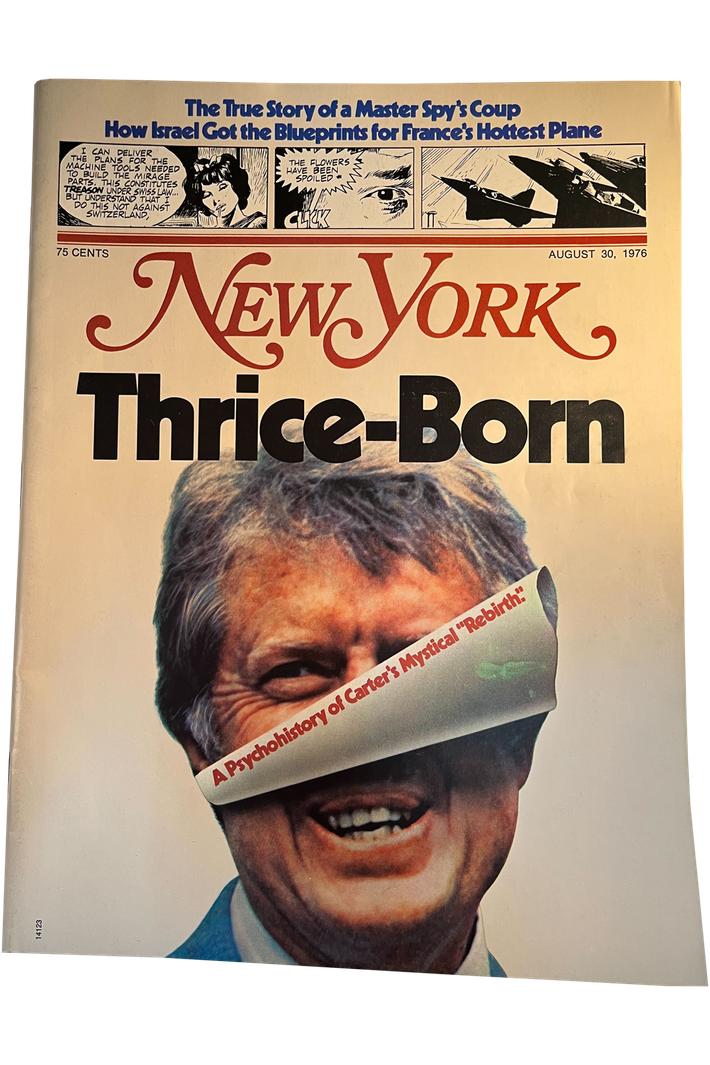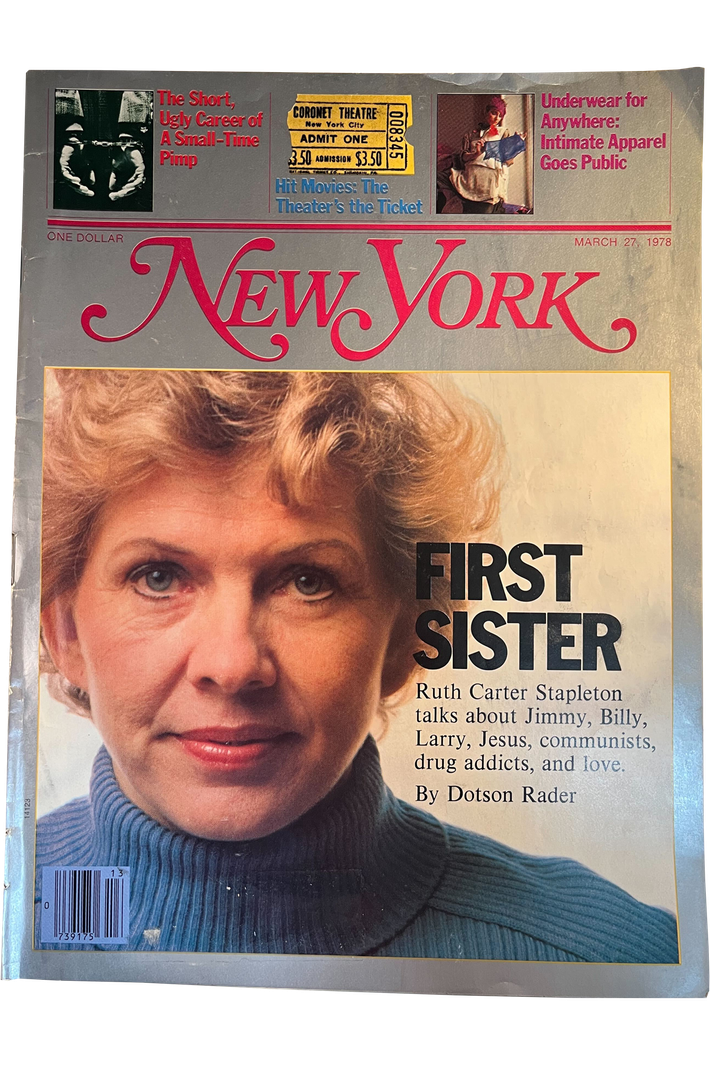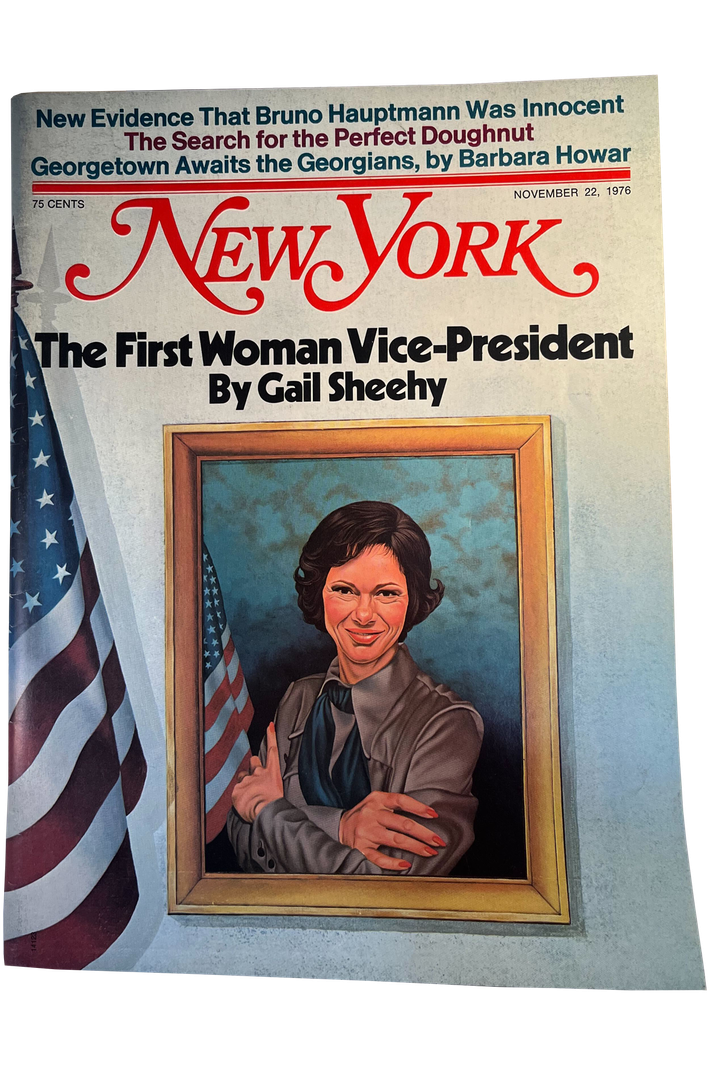
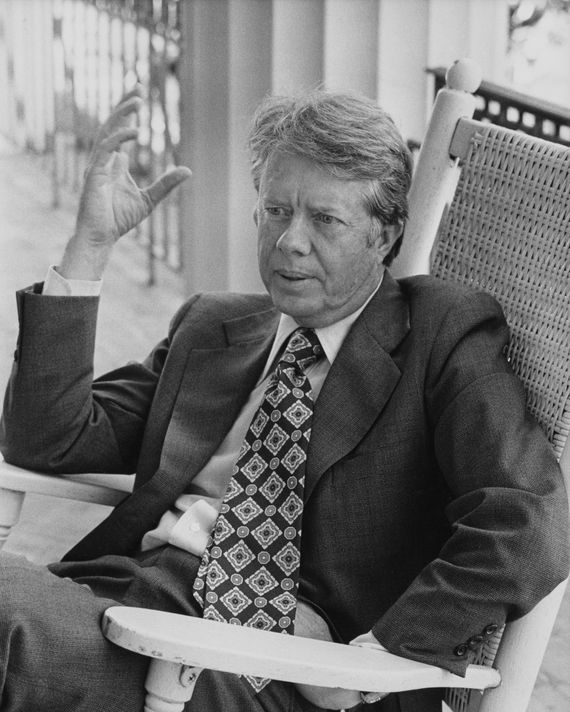
Governor Carter at dwelling in Plains, Georgia, 1974.
Picture: Archive Pictures/Hulton Archive/Getty Pictures
Jimmy Carter was America’s oldest ex-president and had by far the longest former presidency. Certainly, his exceptional life — which ended at the moment after 100 years — might be divided into the stretches earlier than (38 years) and after (43 years) he held public workplace, with a relatively brief stretch of public service (4 within the Georgia state senate, 4 as governor, and 4 as president, plus a few stints of campaigning) between these two eras. Whereas his ascent to the presidency was in lots of respects astonishing, his file as a politician was at finest blended: He gained one statewide political contest in Georgia and misplaced one, then gained one presidential election and misplaced one. Assessments of his presidency by no means fairly turned optimistic in hindsight, and for a few years he continued to carry controversial positions on the last word hot-button worldwide concern, the Center East. Most lately, the return of inflation within the early 2020s introduced again recollections of one of many extra painful facets of his administration’s file.
But the person all the time identified by the casual title of Jimmy turned and remained a beloved determine in his postpresidency, owing in no small half to his dogged, one-foot-in-front-of-the-other efforts to fight such fundamental scourges of the human situation as battle, illness, political corruption, and homelessness.
Carter was born in 1924 on a big household peanut farm close to the hamlet of Plains in southwestern Georgia, the son of an skilled farmer and entrepreneur, Earl, and a educated nurse, Lillian, the exceptional girl who finally discovered fame by becoming a member of the Peace Corps at age 68 as her son ran for governor. He helped in his household’s agricultural and industrial ventures whereas rising up. (One, which he was later to revive and broaden, was wine-making, uncommon for rural Baptists on the time.) Although a dutiful son of the land, Carter longed for journey, and after some preliminary larger schooling, he gained admission to the U.S. Naval Academy in 1943, graduating within the high 10 p.c of his class in 1946, shortly after World Struggle II ended. Across the identical time, he married Rosalynn Smith, a pal of his sister’s from Plains, and the couple quickly started a household that finally included three sons and a daughter.
Carter was nicely launched into a naval profession (notably serving on the analysis workers of Hyman Rickover, the “father of the nuclear Navy,” whose hands-on taskmaster administration type made a deep impression on the younger officer) when his father was recognized with pancreatic most cancers, main Carter to safe a discharge and return to Plains to take over the household farm and companies. By the tip of the Fifties, he was each affluent and stressed, and he turned concerned in civic and political life. He entered politics on the bigger tail finish of Jim Crow, when it didn’t take a lot to get a status as a relative liberal on racial issues. Carter quietly certified by supporting the desegregation of his personal Southern Baptist congregation and refusing to affix the militantly racist White Residents’ Council motion when it reached his county. By the point he bought to the state senate in 1962 (a judicial intervention geared toward a rival’s fraud compelled a second election), he was generally known as a powerful supporter of President John F. Kennedy, whose hesitant help for civil-rights laws and faculty desegregation was greater than sufficient to make him a traitor to many white southern Democrats.
Ensign Carter across the finish of World Struggle II.
Picture: PhotoQuest/Getty Pictures
However in Carter’s preliminary and subsequent campaigns previous to his election as governor, he was hardly a profile in braveness on racial issues. In his first gubernatorial bid, in 1966, he cleverly positioned himself between the self-described liberal ex-governor Ellis Arnall and the infamous segregationist Lester Maddox. (I used to be a kiddie volunteer for that first statewide Carter marketing campaign.) He narrowly missed making a Democratic runoff towards Arnall principally due to Republican crossover votes for Maddox, who was deemed the Democrat that GOP nominee Bo Callaway may most simply defeat. When write-in votes for Arnall compelled the election into the legislature beneath Georgia’s archaic and poorly written Structure, Carter joined most (however not all) Democrats in casting a party-line vote for the buffoonish racist Maddox. I used to be shocked to listen to my hero’s voice clearly asserting a vote for “Lester G. Maddox” on the reside radio broadcast of the balloting, and I didn’t help his subsequent gubernatorial effort.
Carter barely stopped working between 1966 and 1970, and he confirmed his twin reputations for cautious ambivalence on racial points and spectacular (if cynical) political expertise. This time, his principal opponent was former governor Carl Sanders, who had earned the loyalty of Black voters throughout a comparatively enlightened first time period. Whereas Carter was quietly wooing a number of the identical Black civil-rights leaders who would later spearhead his presidential run, his public marketing campaign centered on a populist enchantment to white rural and small-town voters who disliked “Cufflinks Carl” for his company ties and his racial moderation. Most notoriously, Carter supporters extensively distributed pictures of Sanders celebrating a victory with Black gamers from the Atlanta Hawks, the NBA workforce he partially owned. Carter additionally went out of his method to categorical solidarity with Alabama’s George Wallace, who was working an overtly racist marketing campaign in 1970 to recapture energy in Montgomery. Carter consolidated conservative white voters and practically gained a majority towards Sanders within the first spherical of primaries, then dispatched the previous governor handily in a runoff.
However upon taking workplace (after a professional forma general-election victory over Republican TV newsman Hal Go well with), Carter engineered a pointy left activate racial points, making this blunt assertion in his 1971 inaugural tackle:
I say to you fairly frankly that the time for racial discrimination is over … No poor, rural, weak, or Black individual ought to ever must bear the extra burden of being disadvantaged of the chance of an schooling, a job, or easy justice.
Because of his status for quiet decency on racial issues and the energy of his outreach to civil-rights leaders, his marketing campaign demagoguery, not this new departure, was extensively seen as tactical and disposable.
Whereas racially enlightened, Carter’s governorship (restricted on the time to a single time period) was to a major extent centered on the dry course of subject of presidency reorganization. He efficiently proposed to consolidate 300 state businesses into 22. He made small however politically important gestures in areas starting from the equalization of public-education revenues to jail reform and environmental safety.
In the meantime, like most southern (and never a couple of northern) politicians in each events, Carter opposed busing to realize college desegregation. He nonetheless stored himself within the nationwide political information as an exemplar of “New South” Democratic governors (whose ranks included Dale Bumpers of Arkansas, Reubin Askew of Florida, and John West of South Carolina) who had been outmaneuvering the outdated segregationists of their very own celebration whereas heading off Republican positive factors within the area that threatened Democrats’ nationwide viability. They had been the primary actually “nationwide” Democrats within the South for the reason that celebration had absolutely deserted its historical willingness to help, or at the least tolerate, Jim Crow.
Carter’s astonishing rise to the presidency simply two years after a meh single time period as governor of a Deep South state was a testomony to each his distinctive positioning in a Democratic Get together combating realignment and the political expertise he and his advisers typically confirmed at the same time as they had been being mocked as backwoods rubes. Workforce Carter exploited the emergence of the Iowa caucuses as a pre–New Hampshire nominating contest and out-organized the sphere there. He then took benefit of nationwide Democrats’ want for somebody to finish the specter of Wallace’s presidential candidacy by securing help for one-on-one contests with the Alabaman within the South, which Carter gained with the regionally resonant slogan “Don’t ship them a message. Ship them a president.” He used essential help from the Atlanta-based King-family community of civil-rights stalwarts to move off assaults on his doubtful background on racial issues and turned criticism of his lack of expertise into an asset amongst voters nonetheless livid at Watergate-era Washington. Even his Baptist piety turned a promoting level amongst each Evangelicals (who had not but begun their mass exodus to the GOP) and voters inclined to imagine his “I’ll by no means inform you a lie” pledge.
March 22, 1976.
Picture: New York Journal
But it surely was within the general-election contest towards Gerald Ford that Carter’s distinctive regional political enchantment turned essential, as I defined in a meditation on the 2020 revival of the southern Democratic Get together:
[Carter] defeated Wallace in most southern primaries after which gained his endorsement, subsequently placing collectively a mind-bending coalition of Black and conservative white voters united by regional delight (between Andrew and Lyndon Johnson, no president was elected from a state that had been a part of the Confederacy). Carter gained each state of the previous Confederacy (producing large swings in contrast with Hubert Humphrey’s efficiency in 1968 and George McGovern’s in 1972) besides Virginia; he gained the border states of Delaware, Kentucky, and Missouri in addition to southern-inflected areas of Ohio and Pennsylvania that helped maintain these states within the Democratic column.
It’s unlikely that some other Democrat may have gained the presidency in 1976, and Carter gained by an eyelash. But like different regional or ethnic-racial pioneers, his peak of help among the many dwelling people was a factor of the previous as soon as he took workplace. Thus started a troubled 4 years.
Carter with Israeli prime minister Menachem Start in Tel Aviv because the peace talks started.
After profitable in New Hampshire, February 24, 1976.
With Rosalynn at a White Home Congressional Ball, 1977.
Images: Keystone/Getty Pictures, Mikki Ansin/Getty Pictures, Common Historical past Archive/Common Pictures Group through Getty Pictures
Carter’s one-term presidency had its ups and downs and was not often secure or predictable. Sure, he inherited a variety of financial hassle from the Nixon and Ford administrations, however his response to double-digit inflation (involving some austerity measures and a variety of austerity speak) divided Democrats, significantly when the Carter administration deprioritized full employment and put in place a Federal Reserve Board chairman (Paul Volcker) decided to make use of a good financial coverage to tame inflation, triggering a recession.
August 30, 1976.
Picture: New York Journal
This financial turbulence and a carefully related power disaster (each kicked off by the Arab oil boycott of 1973–74 and a subsequent large value spike in petroleum merchandise) led Carter to indulge his inside Baptist deacon and sternly lecture Individuals in regards to the want for belt-tightening and self-discipline. For one well-known week in 1979, he holed up at Camp David summoning advisers and elected officers in preparation for what was later generally known as the “malaise speech” (although he didn’t use that time period). He struggled commonly with congressional Democrats, who joined with Republicans in ample numbers to kill his proposals for a stepped-up federal consumer-protection effort, standby gas-rationing powers, and canceling main water initiatives he deemed pointless. As he had in Georgia, Carter emphasised government-reorganization schemes and did reach creating new Cupboard-level Departments of Schooling and Power.
However international coverage was an unusually massive focus for Carter as president, resulting in a few of his greatest triumphs and setbacks. He invested huge quantities of capital and private time into engineering the 1978 Camp David Accords, the landmark Israeli-Egyptian peace settlement signed by Menachem Start and Anwar Sadat. (It has, terribly, held for greater than 4 a long time.) Earlier that yr, after a protracted, tense negotiation, he secured Senate ratification of a treaty to relinquish the Panama Canal to Panama. Past establishing any particular person bilateral relationships, Carter launched human rights as a key consideration in U.S. international and protection coverage, modifying the strict anti-Communist priorities of his quick predecessors.
March 27, 1978.
Picture: New York Journal
Carter’s interactions with Iran characterised the ambiguities of his presidency, serving to him beat Ted Kennedy within the 1980 Democratic primaries however placing an exclamation level on his general-election defeat.
Kennedy had been main Carter two-to-one in major polls in mid-1979 when the Massachusetts senator all however determined to run; Carter’s combative streak was engaged, and he went out of his method to inform journalists that if Kennedy ran, “I’ll whip his ass.” However a couple of days earlier than Kennedy’s official announcement, Iranian pupil revolutionaries took 66 Individuals hostage in Tehran in response to Carter’s determination — towards the warning of his advisers — to let the deposed Shah of Iran into the U.S. for most cancers remedy. The hostage-taking launched a simmering disaster that didn’t finish till the final day of Carter’s presidency. The worldwide emergency did bolster the incumbent’s public standing, significantly amongst Democrats, and Carter’s “Rose Backyard technique” of working for renomination with out holding private marketing campaign occasions labored, at the least initially. He gained 14 of the primary 15 caucuses and primaries (dropping solely Massachusetts), partially by rebuilding his biracial coalition of help in southern and southern-inflected states.
Kennedy made a comeback within the later primaries, and voters grew uninterested in the hostage disaster (significantly after a rescue try went dangerous in April) and the nation’s continual financial issues. Kennedy gained New York, Pennsylvania, California, and New Jersey, but it surely wasn’t sufficient to defeat the incumbent. Nonetheless, he didn’t concede till the conference and managed to keep away from the normal arms-raised unity gesture with Carter because the proceedings ended.
Carter had his moments within the general-election contest with Republican Ronald Reagan (and his low factors, as when he briefly slipped behind impartial candidate John Anderson within the polls), managing to maintain the race aggressive till late within the marketing campaign regardless of an assortment of ongoing crises in home and international coverage. There have been persistent rumors then and later (and lately, spurred by Carter’s transition to end-of-life care, a confession from an affiliate of Republican energy dealer John Connally) of Republican efforts to speak the Iranian regime out of a hostage launch previous to the election, however the end result was in all probability sealed in any occasion.
Of their one debate, Reagan famously referred to as for voters to make the election a referendum on “the final 4 years,” and proper on the finish of the race, Carter’s numbers collapsed. Reagan gained by practically ten factors, carrying 44 states.
Though he left workplace at solely 55, Carter by no means gave a thought to working once more. His vice-president, Walter Mondale, gained the 1984 Democratic presidential nomination however misplaced 49 states within the normal election, which proved the nation was present process a partisan realignment. Carter’s energy within the South had masked it earlier, maintaining Democratic losses from being a lot worse. However Carter didn’t brood about his difficulties as president and embraced a easy if strong postpresidential agenda that stored him in good stead for over 4 a long time.
November 22, 1976.
Picture: New York Journal
His principal automobile was the Carter Heart, a nonprofit group created in 1982 in partnership with Atlanta’s Emory College; he and Rosalynn Carter served as co-founders. Its three most important worldwide applications have centered on battle decision (in areas starting from North Korea–U.S. nuclear cooperation, to the restoration of democracy in Haiti, to disputes between Sudan and Uganda and between Colombia and Ecuador), election monitoring (in 39 nations), and well being initiatives. The middle has led efforts to eradicate lethal illnesses like Guinea worm and to assist diagnose and deal with others like river blindness and trachoma. It has additionally fought to cut back the stigma of psychological sickness within the U.S. and past. In 2002, Carter was awarded the Nobel Peace Prize for the Carter Heart’s efforts to “discover peaceable options to worldwide conflicts, to advance democracy and human rights, and to advertise financial and social improvement.” He additionally continued his work for Center East peace, resulting in the one large controversy surrounding his postpresidential years: allegations that he was hostile to Zionism and to Israel itself, which grew stronger with the publication of his 2006 e book, Palestine: Peace Not Apartheid.
One other postpresidential dedication of Carter’s (and Rosalynn’s) concerned Habitat for Humanity, a Georgia-based NGO that had lengthy been doing modest work to construct housing for the homeless. The Carters started working with Habitat in 1984 and over time helped it broaden its applications to all 50 states and to 70 nations. We’ve all seen these celebrated images of Carter framing up partitions. Through the 1992 presidential marketing campaign, I used to be having dinner on the Atlanta political hangout Manuel’s Tavern, and I requested a waiter about all the safety loitering round a again room. “Jimmy’s again there displaying Clinton and Gore easy methods to drive a nail,” the waiter replied; positive sufficient, the following day, the three males held a Habitat occasion close by and nary a nail was missed.
Constructing homes with Habitat for Humanity, 1992.
Picture: Mark Peterson/Corbis through Getty Pictures
But the nongovernmental entity to which Carter devoted probably the most years was in all probability the Baptist Church. He taught Sunday college on and off on the Maranatha Baptist Church in Plains from its founding in 1977 as a church that welcomed Black worshippers. Because the Southern Baptist Conference turned militantly conservative within the Nineteen Eighties and ’90s, Carter finally broke any identification with the SBC (particularly objecting to its refusal to ordain girls as ministers) and have become a frontrunner of the reasonable spinoff group the Cooperative Baptist Fellowship.
Carter’s legacy as a president and a politician is substantial however not totally settled. He was prescient in plenty of coverage areas, notably the seek for a complete power technique and his sturdy stance on human rights as a touchstone of U.S. international coverage. He was additionally a private diplomat of nice braveness and talent. From a political perspective, he was the important thing bridge determine between the Jim Crow period of southern politics and the biracial Democratic coalitions that adopted; the Democratic victories in Georgia in 2020 — together with the election of a Black U.S. senator — should have gratified him immensely. However Carter additionally exemplified centrist and even conservative strains within the Democratic Get together that continued whereas white Democratic racist politics largely vanished.
What made Carter’s postpresidential profession so well-liked, nevertheless, was the easy sense, shared far past his personal area or celebration, that he was a basically good man who eschewed riches and energy for a extra humble path to righteousness. He slowly however certainly added up accomplishments that dwarf what he was in a position to do as probably the most highly effective man on earth. Most of all, Jimmy Carter is the everlasting position mannequin for many who by no means cease studying and evolving whereas sustaining extremely constant values regardless of how very lengthy they reside. He had slowly been leaving us for some time, however he will likely be missed.

